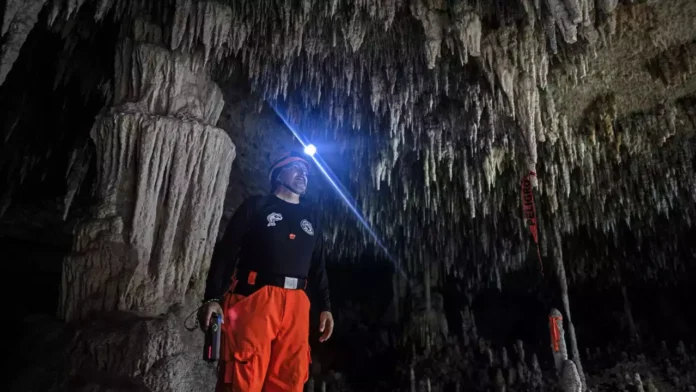A tourist train project in Mexico’s Riviera Maya has sparked environmental concerns as it encroaches on the region’s delicate ecosystems. The Yucatan Peninsula, home to an estimated 2,400 caverns and sinkholes known as cenotes, faces the threat of irreversible damage from the construction of the railway.
The project involves the installation of thick steel columns within a cave, disrupting the natural beauty of the subterranean landscape. These columns serve to support the railway infrastructure, but their presence has raised alarm among environmentalists and conservationists.
Cenotes are a significant attraction for tourists, offering opportunities for swimming and snorkeling in their crystal-clear waters. These natural formations are not only visually stunning but also play a vital role in the region’s ecology, providing habitats for diverse plant and animal species.
The intrusion of the railway into these sensitive ecosystems poses a risk of contamination and habitat destruction. Concerns have been raised about the potential impact on water quality, as well as disruption to the breeding and feeding patterns of wildlife that depend on the cenotes for survival.
Environmental activists have called for greater oversight and regulation of the tourist train project to ensure that ecological concerns are adequately addressed. They argue that sustainable tourism practices should prioritize the protection of natural habitats and biodiversity.
Despite the controversy surrounding the project, proponents argue that the tourist train will provide economic benefits to the region by boosting tourism and creating jobs. However, critics warn that any short-term gains must be weighed against the long-term consequences for the environment.
Local communities and indigenous groups have also expressed opposition to the railway, citing concerns about cultural heritage and land rights. They argue that the project threatens traditional ways of life and sacred sites that hold cultural significance.
As the debate over Mexico’s tourist train project continues, stakeholders must consider the ecological, cultural, and social implications of their decisions. Finding a balance between economic development and environmental conservation is crucial to ensuring the long-term sustainability of the region.
Environmentalists and local communities have raised concerns about the impact of the tourist train project on the region’s fragile ecosystems and cultural heritage sites. The Yucatan Peninsula is renowned for its rich biodiversity, including unique cave systems, lush jungles, and diverse marine life. The proposed railway infrastructure could disrupt these ecosystems, leading to habitat loss, fragmentation, and degradation.
One of the primary concerns is the potential contamination of cenotes, which are natural sinkholes that serve as vital sources of freshwater and are sacred to the Mayan culture. The construction of the railway could lead to soil erosion, chemical runoff, and pollution from construction activities, jeopardizing the pristine water quality of these cenotes and threatening the survival of endemic species.
Furthermore, the project raises questions about its long-term sustainability and the protection of indigenous rights. Local communities, including indigenous groups such as the Maya, have voiced opposition to the railway, citing concerns about land expropriation, displacement, and the loss of cultural heritage. The construction of the railway could disrupt traditional land-use practices, infringe upon indigenous territories, and undermine the rights of local communities to free, prior, and informed consent.
In addition to environmental and cultural concerns, there are also fears about the socio-economic impacts of the tourist train project. While proponents argue that the railway will stimulate economic development and create jobs, critics warn of potential negative consequences, such as increased tourism pressure, gentrification, and the exploitation of natural resources for commercial gain. There are concerns that the project could prioritize short-term profits over long-term sustainability and social equity.
Given these concerns, environmentalists and activists are calling for greater transparency, public consultation, and environmental impact assessments before proceeding with the tourist train project. They emphasize the need for sustainable, community-led development that respects the rights of indigenous peoples, protects biodiversity, and preserves cultural heritage.
Ultimately, the fate of Mexico’s tourist train project hinges on striking a balance between tourism development and environmental conservation. It is essential to prioritize the protection of fragile ecosystems, respect indigenous rights, and promote sustainable tourism practices that benefit both local communities and the environment. Failure to address these concerns could lead to irreversible damage to Mexico’s natural and cultural heritage, undermining the very attractions that draw visitors to the region.

